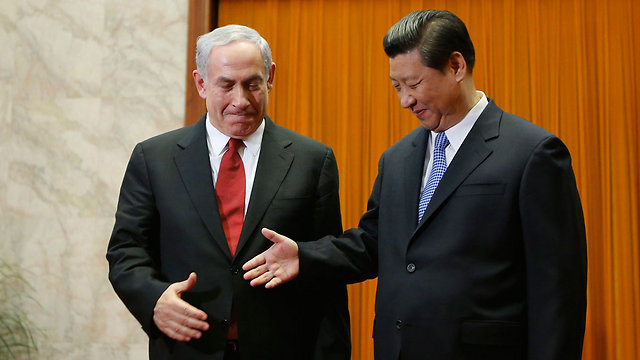
It has been a week since US National Security Advisor John Bolton visited Israel, and Jerusalem has made no official announcement regarding the content of his discussions with Israeli colleagues regarding Israel-China relations. Nonetheless, commentators and journalists with access to senior Israeli officials knew enough to report that Israel was in the process of developing policies connected to issues raised by American officials, and will formulate a series of arrangements through which these sensitive matters will be monitored.
It seems that while Israel is stepping up its policy of running between the raindrops when it comes to the two superpowers, Jerusalem is officially silent. Last week's Bolton talks were preceded by a long series of meetings between American officials past and present with their friends in Israel, and they all had an identical message warning of growing American concern over Israel's extreme openness towards China.
These warnings crossed the lines of former and current administrations, and emphasized the unity of American opinion in both government and academia on this issue.
The development of science and technology on which we Israelis pride ourselves rests not only with our own excellence, but also on the vital cooperation with science and technology professionals in the US and Western Europe. In this context, the European Union announcement last month that it is forced to examine its relations with China on "ports and technology" has become increasingly important. If the Americans and Europeans fear that Israel is developing into a place in which China can gain access to its business and scientific secrets, Israel's achievements of recent decades will face an existent threat. This is not a mere hyperbole.
There is no one in Israel who believes that it is possible or desirable to ignore China, which is expanding its presence and influence in our region. Trade relations with this new regional power are both vital and desirable. For the sake of its own advancement, Israel has in recent years learned to publicly ignore the fact that China is investing enormous strategic resources in Iran, both on the security and industrial-strategic fronts. Israel has never asked China, openly or covertly, to withdraw from the Iranian nuclear agreement brokered by former president Barack Obama. Like Russia, China enjoys full "Israeli immunity" on this issue. This is entirely understandable, but Israel must still be especially cautious in order to serve our own vital interests.
China is a mixture of a free economy and government-run one. Some one hundred Chinese mega-corporations reach all across the world, and decisions on their purchase of assets or their economic activities are made based on both financial calculations and political considerations. As such, all the construction and operation of ports around the world is carried out by Chinese government companies.
Beijing is currently working to establish itself as a presence in the eastern Mediterranean basin even as its ally Iran is making clear that it intends to do the same. And as Russia, China and Iran are busy sailing around the eastern Med, we would do well to heed the words of former US Navy Commander Admiral Gary Roughead, a real friend of Israel, who said that the close proximity of the Chinese would make it difficult for US warships to use Haifa port as a base.
There are extensive cooperation agreements between China and Israel, and their implementation is very important to our economy. But a solid foundation for continued success requires both mutual Sino-Israeli goodwill and careful adherence to our inalienable assets as well as the interests of our strategic anchor in Washington.
The writer is the former head of the Mossad


















